School curriculum
Hagaskóli focuses on improving students' resilience, learning awareness and self-efficacy.
Students at Hagaskóla have diverse subjects. The curriculum focuses mainly on Icelandic, mathematics, English, Danish, science, social studies, physical education, information technology, well-being, arts, and vocational subjects. A wide range of electives is available for 9th and 10th grade students.
The school emphasizes quality teaching through diverse methods and suitable learning approaches. Hagaskóli is implementing formative learning, emphasizing learning awareness, self-efficacy, cognitive challenges and resilience.
Hagaskóli's vision
Hagaskóli celebrates diversity and believes everyone can succeed.
The school emphasizes intellectual challenges, creative thinking and ambition.
Hagaskóli offers vibrant social activities focusing on mutual respect and tolerance.
Mutual trust and respect between staff, students, parents and other school partners are important pillars in successful collaboration.
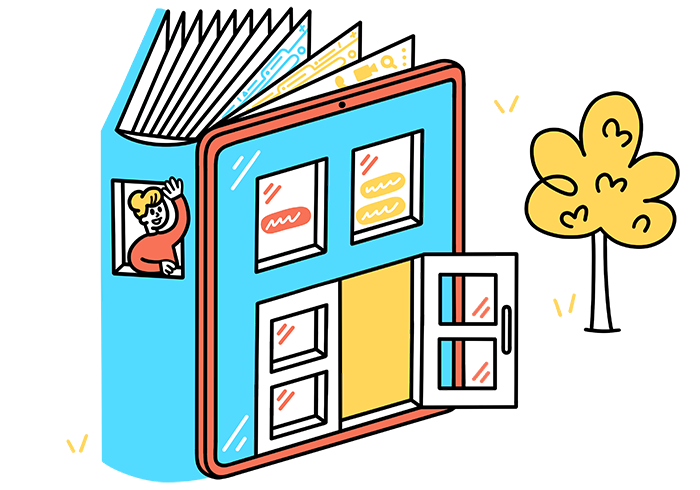
Reading comprehension and literacy
At Hagaskóli, we constantly work with languages, both native and foreign. You hear new concepts, learn new stories and need to contextualize and discover word meanings. We focus on developing methods to understand what we read.
Concept work occurs in all subjects. Language teaching in Icelandic, Danish and English systematically trains reading and comprehension. You need to be alert to learn new concepts and strive to understand.
You train literacy and comprehension by:
• Reading literature
• Discussing course material
• Writing about course material
• Listening to content related to course material
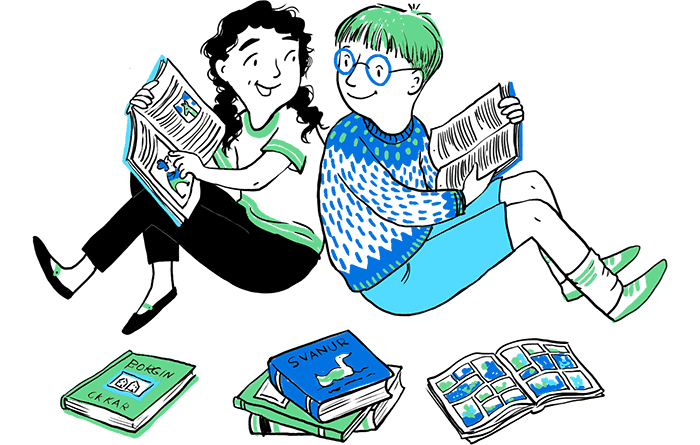
Expression
Part of training comprehension and vocabulary is using them in conversations and active expression. You need to articulate your thoughts and discuss current issues so others understand you well.
We work on expression in spoken and written language in most subjects, through presentations, essays, writing projects, video production and discussions.
You train expression and conversation by:
• Giving presentations
• Making videos and audio recordings
• Participating in discussions and thoughtful learning spaces
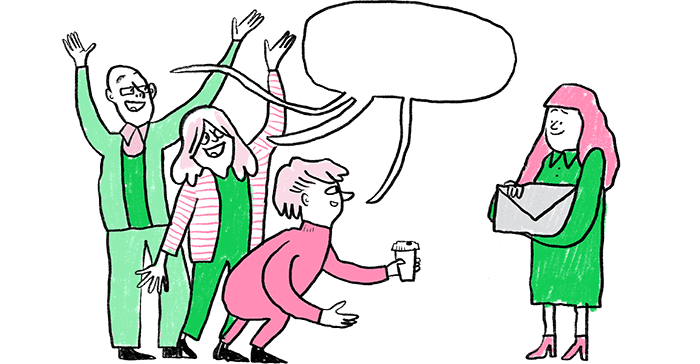
Environment and science
Understanding the language of mathematics and natural sciences can be useful in many daily life tasks.
We emphasize approaching science subjects actively where you work on problem-solving, sometimes alone but often using discussions and collaboration to enhance concept understanding and practice various methods.
You do various projects such as experiments, measurements, field observations, calculations and training in mathematical methods.
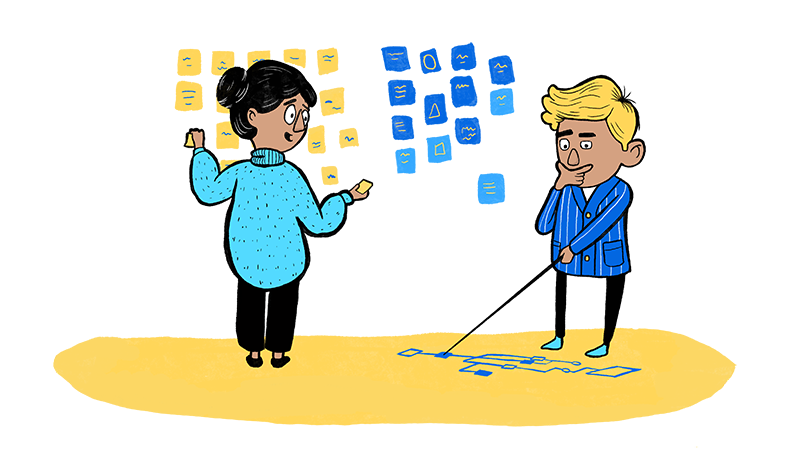
Diverse society
We want to build individuals with strong self-image and understanding of society and its diversity. You will work with your own emotions and practice reading others' emotions.
At the same time, you will enhance understanding of society and its history, work with various social challenges and practice putting yourself in others' shoes.
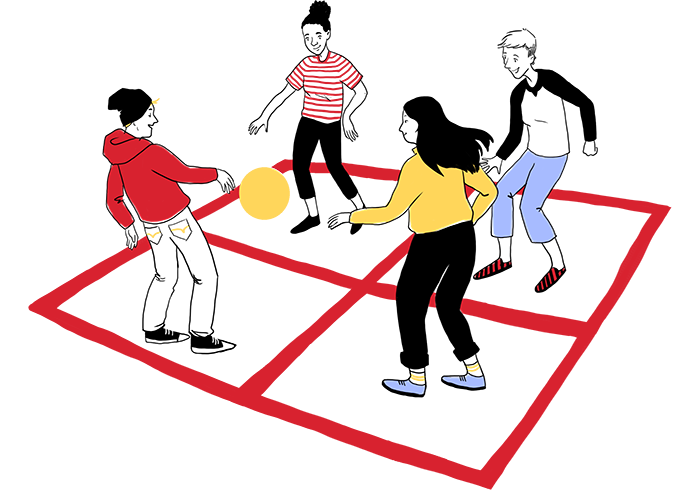
Creativity, arts and design
We emphasize creative methods, arts and design in all learning. You will learn about design thinking, innovation and creative project delivery. There is a special focus on arts and vocational subjects in 8th grade.
Every other year, you can participate in a musical production. This enhances your artistic side through acting, singing, playing instruments, costume design, makeup or other roles.
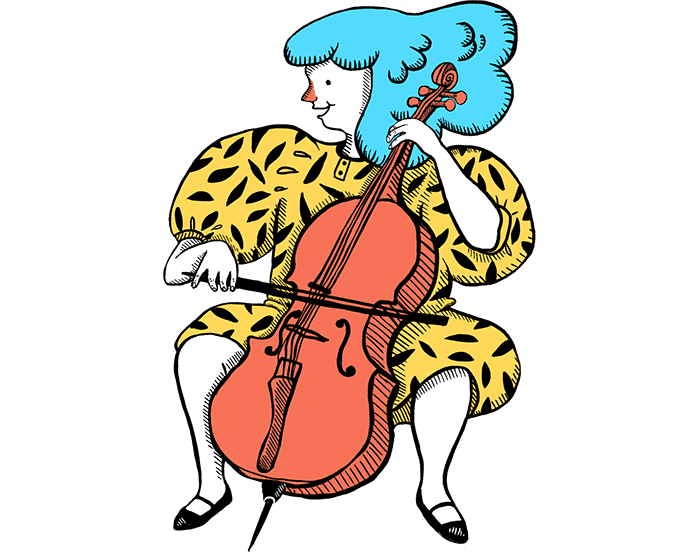
Promoting physical and mental health
Wellness classes focus on students' mental health, sexual health and prevention. You'll have opportunities to consider ways to nurture your mental health.
In sports and swimming, you'll exercise your body and find ways to strengthen yourself physically.
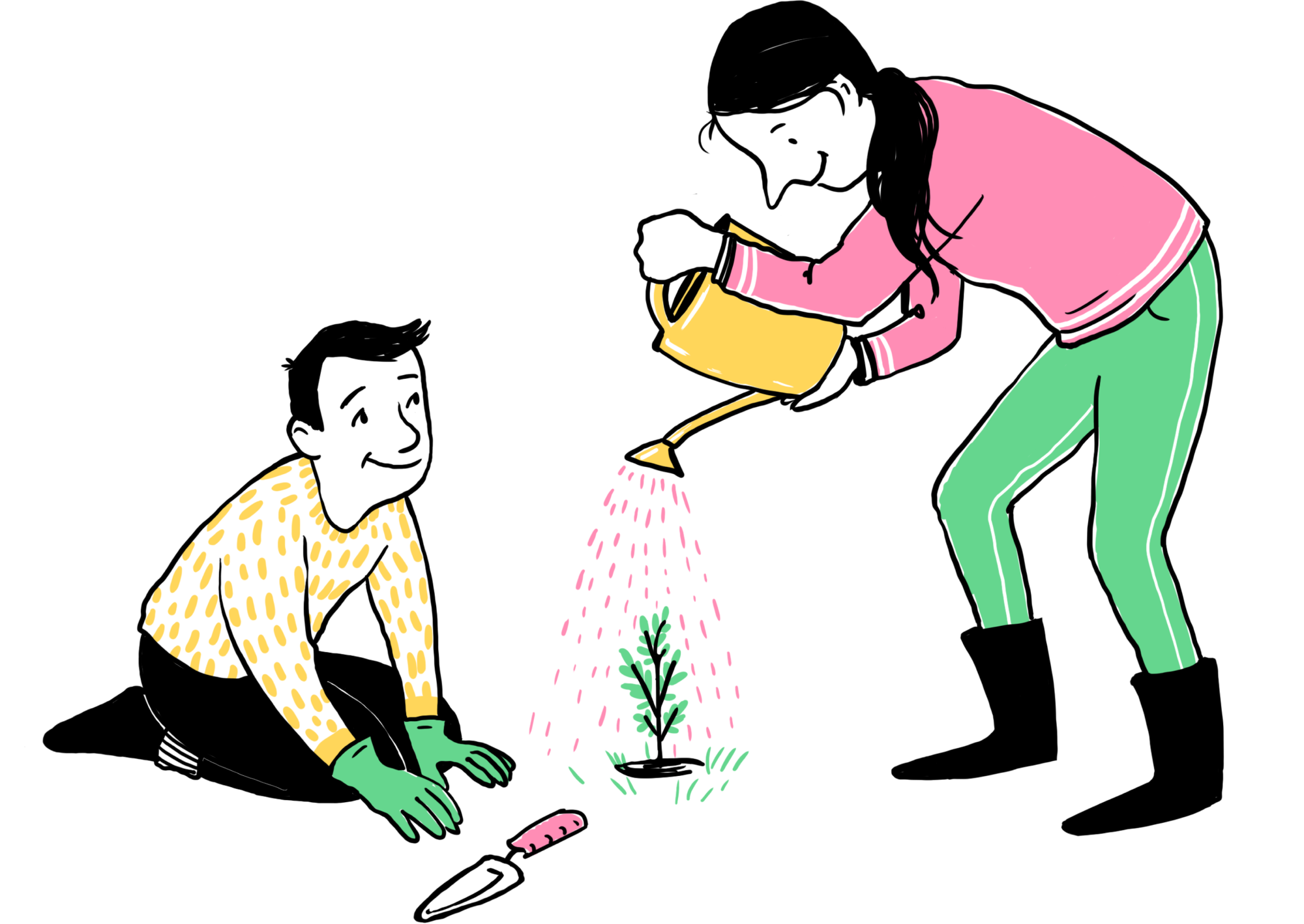
Digital reality
We emphasize teaching students to recognize the pros and cons of information technology. You'll access a digital learning environment and work on developing digital citizenship. You'll evaluate information you find, use technology for creative project submissions and reflect on social media's role in our self-image.
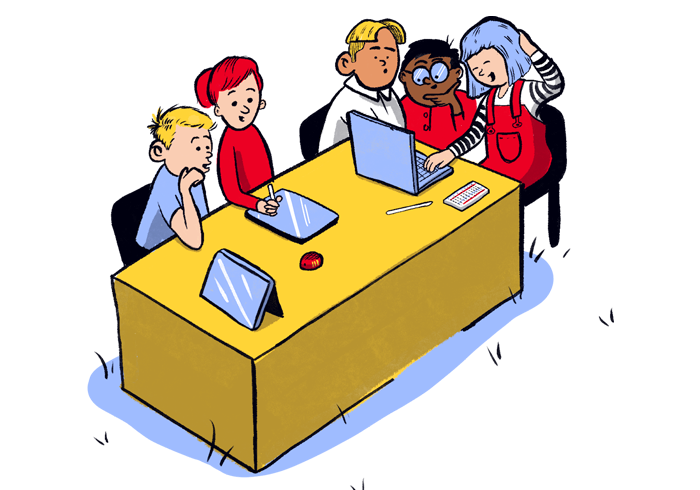
Your toolbox
After your years at Hagaskóli, you will have:
- used languages, both your native tongue and foreign languages, to learn about the world and express yourself
- tackled complex subjects and trained your brain to find solutions, understand new words and concepts
- practiced working with others, listening to others' opinions and participating in democratic discussions
- practiced not giving up and believing you can solve diverse tasks, even if you haven't seen them before
- learned about your strengths, built skills to better understand people around you and treat others with respect
- tried various approaches in creative and artistic work
- learned to use information technology to access and share reliable information
... this way our years at Hagaskóli contribute to well-rounded development, preparing you for participation in an ever-evolving democratic society
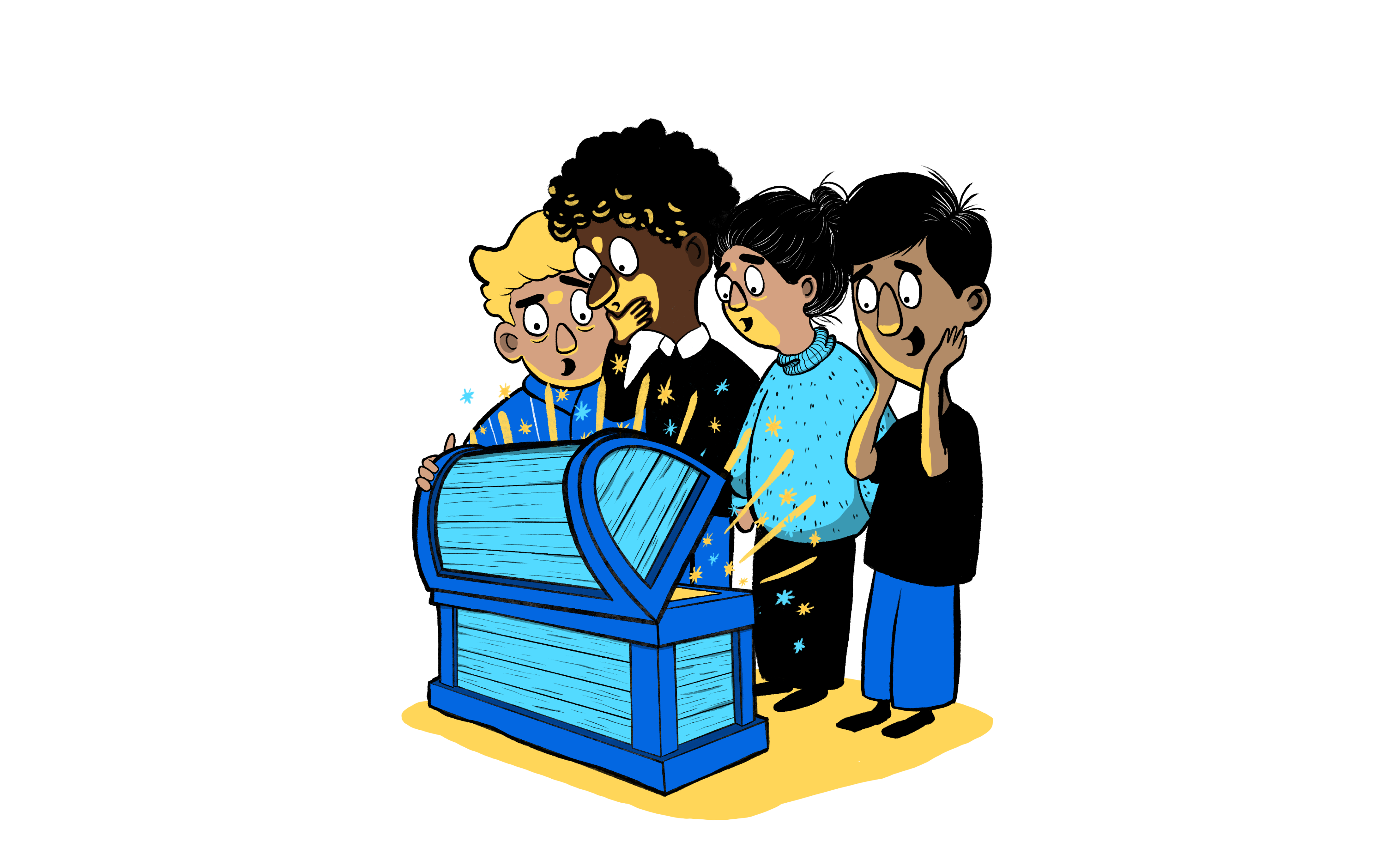
Subject areas
Icelandic
Proficiency in one's native language is essential for communication, information sharing and education. Reading is crucial for acquiring knowledge. Verbal and written expression are necessary for participating in society.
Icelandic teaching emphasizes developing a positive attitude toward the language. Students need to believe in the usefulness of the language. It's important to maintain existing knowledge and build upon it. Students should have opportunities to test their language skills when solving problems, expressing thoughts and opinions, and learning about the language's characteristics and importance in the school community, which is a venue for discussion, communication, reading and writing.
The school emphasizes diverse teaching methods and educational assessment. The school is implementing formative learning, which will influence teaching and assessment. Icelandic proficiency standards are divided into several categories. These categories are interconnected parts of a whole, often involving cross-category and cross-subject work. Student projects are assessed based on proficiency standards and continuously updated on students' proficiency cards throughout the year.
The goal of Icelandic studies is to make students powerful language users who know their native language and can use it confidently. Studies at Hagaskóli primarily focus on the following areas. We enhance literacy and reading comprehension through daily reading of various texts, reading fluency tests and interactive reading. We improve spoken language through regular presentations of various types. Emphasis is placed on interpretation and critical thinking about what is listened to and watched. Literary analysis is enhanced through reading, interpretation and application of literary concepts in written or spoken form. We primarily improve writing through composing various texts, either creative or adhering to appropriate language style guidelines. Correct spelling is emphasized in all writing. Language and usage are enhanced through diverse grammar exercises, learning characteristics of all word classes, using proverbs and idioms, and discussions about the language. The goal of grammar teaching is to make students capable of discussing language and usage, improve their language skills and spark their interest in the language.
After three years of study in the subject, students should be able to:
- Deliver their speech clearly and audibly with appropriate speed, intonation and manner, and express their ideas and opinions in diverse ways.
- Listen to spoken language and use various audio and visual media for information and entertainment, take a stance on what is presented and communicate its content.
- Read various texts confidently and fluently using methods appropriate to the occasion and situation.
Evaluate and understand the connections between content elements and apply a rich vocabulary, knowledge and experience to create context. - Read, interpret, evaluate and discuss diverse literature and apply common literary concepts in their discussion.
Read and understand texts from earlier times, recognize their historical context and compare them to their own era. - Read and discuss diverse poems from various periods.
- Apply organized and good working methods in writing and master various ways to communicate written language.
- Arrange content elements in context and form paragraphs clearly, choosing text types and language styles appropriate for the work, including in creative writing.
- Apply spelling and punctuation confidently.
- Apply their knowledge of grammar in discussions about the language, its characteristics and diversity, and use it in various ways in speech and writing.
- Understand the inflectional and semantic characteristics of word classes and recognize their roles.
- Use various tools to support their language use.
Mathematics
The goal is to provide appropriate challenges for students. Tasks should be accessible to all while also being demanding. We believe in students' abilities. With active participation, they can achieve success in mathematics. It's important for students to develop confidence in their abilities and feel comfortable in math classes.
There's an emphasis on diverse teaching methods. Mathematical discussions and collaboration are emphasized. Working with classmates on challenging projects, students gain space and tools to apply creative thinking in their studies.
Educational assessment in mathematics is based on formative learning ideas. It takes place in various ways. Formal assessment occurs through oral exams, written tests, presentations and assignments.
The national curriculum's assessment criteria state that by the end of 10th grade, students should be able to:
- Express mathematical ideas clearly
- Use mathematical concepts and symbols to present, represent and solve problems
- Use various tools for mathematical work, analyze and interpret mathematical models, and present results clearly
- Use real numbers and calculate with rational numbers, analyze relationships between numbers in different number sets
- Participate in developing solutions, use connections between arithmetic operations and apply this knowledge in calculations and evaluations
- Investigate patterns and generalize about them, solve equations, use variables and describe their relationships with expressions and functions
- Use fundamental geometry concepts in various ways
- Use similarity, angle rules and coordinate systems to draw, analyze and create geometric objects
- Present geometric arguments, measure and calculate length, area and volume, and use computers for these tasks
- Use statistical concepts to organize, conduct and interpret statistical research
- Conduct and draw conclusions from experiments involving probability and chance
- Use probability concepts and counting to calculate and interpret the likelihood of events
Danish
Danish studies align with the National Curriculum for Primary Schools' competency goals. These goals fall into seven categories: listening, narration, reading comprehension, writing, communication, cultural literacy, and learning skills. Topics adapt to grade levels based on competency goals. This ensures continuous skill progression from 8th to 10th grade.
Teachers work steadily with competency goal topics throughout the term. Students complete various exercises to practice these skills.
The emphasis is on diverse teaching methods, considering different learning approaches and student levels. The course equally covers the main language aspects: reading, listening, speaking, and writing. Teaching materials come from various sources, including MMS books, online content, and Danish media. Students regularly practice listening to spoken language and complete exercises testing comprehension. Grammar integrates with reading and writing, focusing on reviewing main word classes and their characteristics. Various writing assignments accompany book reading and watching TV shows and movies. Students learn about Danish society, culture, and customs through films and music.
By the end of 8th grade, students should be able to:
- Talk about themselves and their interests in simple language
- Know and use basic vocabulary related to family, home, and hobbies
- Read short texts of various types related to course topics
- Write simple texts about familiar subjects
- Identify main word classes nouns, verbs, adjectives
- Develop good study habits
- Watch and listen to children's content, understanding main points
By the end of 9th grade, students should be able to:
- Know and use vocabulary related to culture, media, fashion, emotions, behavior, and experiences
- Read various text types related to course topics
- Write texts about familiar subjects
- Continue working with main word classes nouns, verbs, adjectives
- Deliver short presentations on prepared course-related topics
- Follow spoken language in TV content or listening exercises
By the end of 10th grade, students should be able to:
- Know and use vocabulary related to future, education, and employment
- Read short novels for young people and various short academic texts
- Know all main grammar points nouns, verbs, adjectives
- Clearly express opinions, answer questions, and deliver presentations on course topics
- Follow and understand various TV content and other audio material, using it in their studies
- Know main cultural aspects and understand the nation's diversity
- Develop good work habits
English
After three years of study at Hagaskóli, students will be able to read and interpret various types of texts, including fiction, poetry, and texts containing facts and opinions. Students will learn specific methods and skills for written expression, including following main grammar rules, text formatting, and citation guidelines. Students will demonstrate the ability to understand spoken English (listening exercises and tests), express themselves on diverse topics, and engage in meaningful conversations. Students will gain knowledge of various dialects and different cultures of the English-speaking world.
By the end of 8th grade, students will be able to:
• Read news articles, academic texts, and novels intended for upper primary school students. Students will read the novel "Holes" and watch the film adaptation, focusing on developing skills to work with various text types, draw conclusions, and form opinions on content.
• Write paragraphs and essays following writing conventions, express opinions, and write original short stories; write using English sentence structure, follow comma and period rules, understand subject-verb agreement, and distinguish between commonly confused words.
• Speak loudly and clearly, delivering a one-minute presentation on a familiar topic in front of an audience.
• Follow classroom instructions and teacher guidance closely.
• Engage in meaningful communication with teachers and classmates, participate in various oral assignments (e.g., interviews or speed friending), and complete an oral exam.
• Develop good study habits and cite sources of information.
By the end of 9th grade, students will be able to:
• Read news articles, academic texts, and novels intended for upper primary school; read the novel "Ugly" in English and watch the film "Wonder"; focus on developing skills to work with various text types, analyze paragraphs, summarize content, and identify themes.
• Write opinion paragraphs supported by sources, and write short stories on assigned topics; learn paragraph structure and punctuation such as colons, semicolons, verb tense consistency (past vs. present), and challenging commonly confused words.
• Speak loudly and clearly, delivering a three-minute presentation on a familiar topic in front of an audience.
• Listen to and understand content about common interests.
• Engage in meaningful debates with teachers and classmates through interviews and regular peer conversations. Complete oral exams testing logical reasoning.
• Develop good habits for analyzing source origins and paraphrasing new information.
By the end of 10th grade, students will be able to:
• Read news articles, academic texts, and novels intended for upper primary school; read either "Walk Two Moons" or "The Wave"; focus on developing skills to work with various text types, identify central ideas, and cite reliable sources.
• Write a detailed academic essay in English, write a short story in English; follow standard essay structure, use correct punctuation, and distinguish between complex commonly confused words.
• Deliver a fluent presentation on complex concepts and ideas, informatively explain topics, and be prepared to answer questions.
• Listen to and understand content about academic reflections on the English language.
• Engage in meaningful debates and communications considering all participants, through group work and oral exams.
• Develop excellent research skills; cite reliable sources according to proper guidelines.
Cultural literacy:
• Identify diverse and extensive English dialects.
• Explain the spread of the English language in historical context.
• Understand the history of English and how it has shaped the English-speaking world.
• Make informed decisions about adopting spelling conventions of specific dialects (British, American, Australian, etc.).
Natural sciences
At Hagaskóli, we promote students' knowledge, respect and sense of responsibility for nature, technology, society and the environment. This helps them gain the skills needed to make informed decisions on issues concerning people's relationship with nature.
We combine classroom learning with practical exercises and field research in the local environment. Student progress is assessed through continuous evaluation in line with formative assessment principles.
In 8th grade, students learn the basics of chemistry and explore biodiversity and taxonomy of organisms.
In 9th grade, students study electricity and magnetism, the nature of light and sound, and human biology.
In 10th grade, students learn genetics and evolutionary theory. They also study nuclear physics and the fundamentals of mechanics and astronomy
By the end of their time at Hagaskóli, students should be able to:
- apply common natural science concepts
- read, analyze, interpret and communicate about texts and images related to natural sciences and technology
- conduct observations and experiments, record results, draw conclusions from data, and provide different explanations using various perspectives
- evaluate and analyze information related to natural sciences and explain the impact of natural sciences on knowledge creation, technological development and people's daily lives.
- describe the cycle of matter and energy in nature and the needs of organisms in different ecosystems
- explain human impact on natural cycles and processes
- analyze, explain and critically discuss issues related to the environment, nature conservation and climate change, and explain their impact on quality of life and nature
- discuss their own life views and responsibilities within society and plan improvement actions
- gather information about characteristics of organisms and evolution and explain them
- explain the structure of materials and their different properties
- explain different forms of energy and critically discuss human use of energy
- conduct investigations based on research questions and write critical conclusions
- describe land formation and the natural processes that affect it
- explain Earth's position, the moon's influence, and the structure of the solar system
- discuss the main phenomena of the universe
Social studies
Social studies explore students' identity, self-knowledge and relationships. They examine students as part of society and culture in a broad context.
Social studies provide a foundation for teaching and training in self-knowledge, equality, and the rules and values of a democratic society. They show how individuals can impact their own lives and communities.
Social studies cover historical events and help students understand what makes a good life on Earth. They teach how to respond to environmental challenges and strengthen students' understanding of justice, freedom, friendship and respect.
Social studies use diverse assessment methods in consultation with students. Students often choose how to present work based on their interests and strengths.
AFTER COMPLETING STUDIES AT HAGASKÓLI
Students should be able to...
interpret and use information about social issues in various forms and form opinions- explain and apply social studies concepts, and discuss social and ethical issues from different perspectives in an organized and diverse manner
- actively and positively participate in critical dialogue and democratic cooperation
- independently analyze and discuss how various factors shape self-image, mindset, communication and behavior
- explain the role of ethics, religion and life views on individuals' lives and identify their different manifestations and impacts in societies
- discuss individuals' status as participants in society, their rights, duties and capacity for action
- explain the value of human rights and democracy
- discuss the government system and its impact on individuals' lives
- discuss historical events near and far, their causes and effects from different perspectives
- compare different cultures based on people's conditions and lives, using diverse information on maps
- explain human impact on Earth and the importance of sustainable development for the environment, society and economy
Arts education
Arts education aims to help students:
- creatively face an unpredictable future
- see new patterns and think of solutions
- develop personal expression and taste
Drama
Drama focuses on stepping outside comfort zones to build self-image and confidence. Emphasis is on small and large group collaboration. Initial focus is on team building and trust. Trust is key for drama enjoyment and daring. As the term progresses, students tackle more difficult projects. Students learn drama through teamwork, exercises, games and improv.
Main topics:
- Trust and collaboration
- Body language and pantomime
- Where, who and why
- Character development
- Concentration and attention
- Speech and voice projection
- Listening and reacting
- Improv
Music
Music education enhances students' sensitivity and knowledge of music fundamentals: pitch, duration, timbre, dynamics, chords, interpretation and form. This helps them form opinions on different music styles, understand its value in their culture and life, and enjoy it constructively.
Music creation is the main focus. Students learn about the creative process and how to be aware of it while working. Classes introduce various cultural elements from past and present, connecting to students' own music creation.
Each group then explores current issues to address through composing music, aiming to improve their community. Work includes film music, self and alter ego in music, storytelling through music, and analyzing works of artists like Aldous Harding, Nina Simone, Tyler the Creator, Moondog, Steve Reich and others.
The school environment is explored for its sounds, creatively working with recordings and experiencing environmental sounds.
Visual arts
Visual arts emphasize creation and experiencing art as an integral part of human existence. The concept of artistic creation is examined, exploring its meaning and the importance of creative thinking in all endeavors. Focus is on the process from idea to completion.
Students are encouraged to experiment, try new methods and develop what they like. They enhance visual literacy and the ability to understand and interpret visual information. This is taught through discussions, questions and experiments leading to a final product. The goal is to broaden perspectives, promote critical thinking and practice argumentation.
Main topics:
- Focus on visual arts and drawing-visual art, artist presentations, styles and movements. Brief coverage of filmmaking, photography, architecture and applied arts like industrial design, graphic design, fashion design, interior architecture and decorative arts.
- Students take one museum trip per term and participate in Reykjavík City's Children's Culture Festival, held annually, where they can exhibit their work in an art museum.
- Students compile a portfolio of their work, self-evaluating throughout and at term's end.
By the end of 10th grade, a visual arts student can:
- choose between different creative methods, experiment, and develop ideas in various media and techniques
- demonstrate and explain the process from idea to final work, including research, experiments and dialogue
- record and present ideas in diverse ways based on imagination and/or research, visually and/or in text
- express opinions or feelings in their own creation, connecting to personal experience and social criticism
- critically evaluate their own work and others' with knowledge, fairness and respect, both individually and collaboratively
- analyze how visual stimuli in daily life affect our lives and values, both in society and globally
- use vocabulary and concepts of visual arts principles to express opinions on art and design, supporting them with personal values
- analyze how contemporary art addresses daily issues using diverse methods, often integrating art forms
- explain the various purposes of visual arts and design, placing them in diverse contexts
- analyze, compare and describe various styles and movements in visual arts and design, placing them in their cultural context, both in Iceland and abroad
Vocational subjects
Textile crafts
Textile education follows the national curriculum's competency criteria, divided into three categories. Here are the criteria for 8th grade:
Crafts, methods and technique:
- use various methods and tools to shape textile products,
- work with patterns and recipes, take measurements, estimate sizes and material needs.
Creation, design and execution:
- apply creative and critical thinking in design and textile work,
- decorate textile products in a creative and personal way,
- evaluate own work methods, describe good craftsmanship, form and design using appropriate concepts.
Culture and environment:
- discuss main symbols and markings of textile materials,
- describe textile production in different conditions and relate to sustainability and environmental protection.
Crafts, methods and technique criteria promote knowledge of various materials and methods, enhance skills and encourage use of appropriate tools. Creation, design and execution covers aspects of creativity, design and idea work, understanding work processes and recognizing the value of craftsmanship. Culture and environment aims to enhance students' understanding of culture and environment related to textiles. Environmental protection and awareness are emphasized.
Main topics
- computer bag: Introduction to textiles, simple pattern making, paper collage, sewing machine practice, recreating collage in fabric, sewing fabric pieces, assembling bag and finishing
- embroidery: Introduction to thread artists, embroidery sample with four stitches, writing assignment about a thread artist, sketching, embroidery on paper and fabric, embroidering an environmental hero on paper
Evaluation focuses on students' work methods from idea development to execution, originality, independence and progress.
Design and carpentry
Diverse teaching methods are emphasized. Students learn about design and its sub-disciplines. They practice methods for practical and creative idea work. They learn basics of comprehensive idea work and specific methods to activate and develop their ideas. Students are introduced to designers and artists who use wood in their work. They practice developing ideas, working independently and in groups, presenting ideas, and constructively evaluating and discussing their own work and others'. Respect for others' ideas is emphasized.
Students complete various projects in the workshop, learning to work from idea to final product and analyze different approaches.
They learn responsible and safe practices in work and cleanup, and correct tool use. Emphasis is placed on following teacher instructions and showing independence in work methods. Students should explain suitable work postures and choose appropriate safety equipment.
Main topics
- What is design?
- Various methods in idea work.
- Group and individual projects
- Various woodworking projects based on student ideas.
- Projects focusing on assembly.
By the end of 10th grade, students should be able to:
- participate in collaboration with group goals in mind.
- independently apply techniques of the subject.
- discuss their projects using subject-specific concepts.
- evaluate their own and others' work, justifying opinions with subject-specific concepts.
- show initiative in maintaining a tidy workspace.
- demonstrate responsible and safe practices in work and cleanup.
- correctly choose and use main tools and measuring devices.
- explain correct work postures and choose appropriate protective equipment.
- perform simple assembly.
Well-being
Self-care, well-being and mental health are main focus areas of VEL. Self-knowledge and self-acceptance are important tools for students in daily life. Well-being is essential for a positive outlook on life and general success in studies and work. The main thread of VEL in 10th grade will be DBT - dialectical behavior therapy focusing on mindfulness, emotion regulation, distress tolerance and interpersonal effectiveness. In both 8th and 10th grade, lectures, projects and discussions will cover team building, values, study techniques, strengths, mental health, bullying, LGBT+ issues, sex education and prevention.
8th grade
| Topics | Success guidelines |
| Team building | Students create a good class spirit and trust within the class. |
| Mindfulness | Students recognize various mindfulness techniques, can focus on the present moment and understand its benefits. |
| Self-image | Students express who they are in their own eyes and others' |
| Communication | Students recognize the importance of communication skills and engage in respectful interactions |
| Friendship | Students distinguish between healthy and unhealthy relationships, set and respect boundaries, and understand the value of friendship |
| Emotions | Students describe the diversity of emotions and identify the interaction between emotions, thoughts, behavior and communication |
| Bullying | Students recognize the main characteristics of bullying, responses and prevention. Students understand the importance of personal responsibility and tolerance. |
| Sex education | Students understand concepts such as boundaries, consent, communication, intimacy, rejection, peer pressure, puberty, sexual health and contraception, |
| LGBT+ education | Students are aware of LGBT+ issues, know diverse concepts and respect different groups of people |
| Study techniques | Students can use methods for independent and thorough work habits |
| Values | Students argue for the value of positive life attitudes, virtues and values as an important part of a healthy self-awareness |
10th grade
| Topics | Success guidelines |
| Team building | Students create a good class spirit and trust within the class. |
| DBT (mindfulness, emotion regulation, distress tolerance, interpersonal effectiveness) |
Students evaluate opinions and information, respond in an unbiased and fair manner,
show self-discipline, self-confidence and respect in various interactions and collaboration with diverse individuals. |
| Sex education | Students have a good understanding of sexual behavior, boundaries, sex and sexual health, and the human body. Students distinguish between healthy and unhealthy relationships, can recognize violence, power and power imbalances, and appropriate resources. |
| Gender studies | Students apply concepts of sex, sexual orientation and gender roles and explain their function in individuals' gender identity and self-image. |
| LGBT+ education | Students have a good understanding of concepts such as marginalization, prejudice and discrimination. Students know diverse LGBT+ concepts and respect different groups of people. |
| Bullying | Students recognize the main characteristics of bullying, responses and prevention. Students understand the importance of personal responsibility and tolerance. |
| Prejudice | Students identify positive and negative stimuli and resist pressure that endangers people's health and welfare |
| Privilege | Students put themselves in the shoes of people with different backgrounds and attitudes, in various places and times. |
| Study techniques | Students can use methods for independent and thorough work habits |
Sports
Missing text